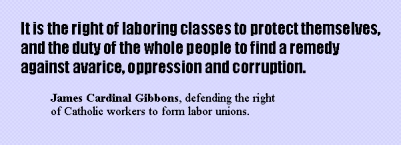| Archbishop
of Baltimore, Maryland, and leader of U.S. Catholics through turbulent
times. |
 |
|
|
Born into a family
of Irish immigrants, James Gibbons became a priest in Baltimore, a bishop,
and then an archbishop. He exercised leadership in three areas vital to
the future of Roman Catholicism in America. 1) nineteenth
century immigration not only made Catholics the majority of Christians
in America; it also brought ethnic tensions into the church, over authority
and leadership, language and identity, and popular piety. Gibbons worked
to keep the American Catholic church together. 2) The Catholic labor movement
sought better wages and working conditions without embracing socialism,
which Rome condemned. Gibbons' advocacy played an important role in gaining
papal permission for Catholics to join labor unions. 3) Anti-Catholicism
persisted in the U.S., in part because Protestants assumed that loyalty
to Rome undermined democracy. Serving as advisor to several Presidents
on Catholic affairs, Gibbons showed Roman Catholicism to be compatible
with American life. He helped bring American Catholicism toward greater
acceptance in a society increasingly marked by pluralism.
|